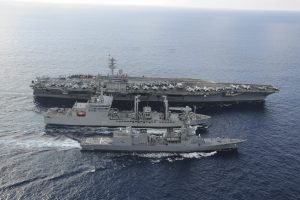On Monday, the Indian Ministry of Defense issued a release on the upcoming trilateral India-U.S.-Japan Malabar exercises, noting that this year’s iteration would include Australia. “As India Seeks to increase cooperation with other countries in the maritime security domain and in the light of increased defence cooperation with Australia, Malabar 2020 will see the participation of the Australian Navy,” the release noted. The exercise will be held in the Indian Ocean.
The decision to add Australia will make the upcoming iteration of Malabar the first exercise to include all four Quadrilateral Security Dialogue, or “Quad,” states since the grouping’s reconvening in November 2017 after a decade-long hiatus. The Royal Australian Navy last participated in Malabar 07-02 in September 2007; that iteration of the exercises also included a small Singaporean contingent. That exercise also coincided with the original convening of the Quad. The grouping was later disbanded after Chinese opposition.
Australia’s return to Malabar will no doubt be framed as growing evidence of the seriousness of the reconvened Quad. Canberra’s inclusion in the drills comes at a time of heightened tensions between China and the Quad states. Notably, India, which viewed Canberra’s participation in Malabar with a certain degree of caution, has shed its previous hesitations amid a monthslong border standoff with the Chinese People’s Liberation Army in Eastern Ladakh this year.
The Indian Ministry of Defense’s announcement on Malabar this week makes crystal clear that Canberra’s inclusion is meant to be read in the context of ongoing efforts by the Quad countries to “collectively support [a] free, open and inclusive Indo-Pacific.” “The participants of Exercise Malabar 2020 are engaging to enhance safety and security in the maritime domain,” the release added.
A joint release by the Australian foreign and defense ministries noted that Canberra’s participation in Malabar marks “a milestone opportunity for the Australian Defense Force.” Linda Reynolds, Australia’s defense minister, noted that the “High-end military exercises like MALABAR are key to enhancing Australia’s maritime capabilities, building interoperability with our close partners, and demonstrating our collective resolve to support an open and prosperous Indo-Pacific.”
The expansion of Malabar is likely to further the integration of the Quad and reflects positive trends in India-Australia security cooperation. Arguably, the Canberra-New Delhi relationship has been the weakest of the Quad’s constituent bilateral relationships. That’s quickly changing as the two countries expand cooperation on defense policy planning and keep up high-level exchanges, including a “2+2” dialogue between their top foreign and defense officials set up in 2017.
Having started as bilateral U.S.-India naval exercise in 1992, Malabar was formally trilateralized in 2015 to include the participation of the Japan Maritime Self-Defense Force on a permanent basis. The decision to add Japan came seven years after India and Japan signed a 2008 joint declaration on security cooperation, reflecting growing convergence between New Delhi and Tokyo.
Australia’s return to Malabar underscores the Quad’s expanding agenda in its post-2017 incarnation and will no doubt be closely watched in China. This year’s Malabar will likely have the effect of raising expectations for the Quad going forward. For instance, Australia’s potential non-participation next year could be seen as a step back. For now, there’s no indication that Malabar may be formally quadrilateralized, but that would appear to be the next goal for the Quad’s proponents. Either way, the fact of this year’s exercise should also increase the odds that the four navies conduct coordinated and joint activities elsewhere in the Indo-Pacific.

































